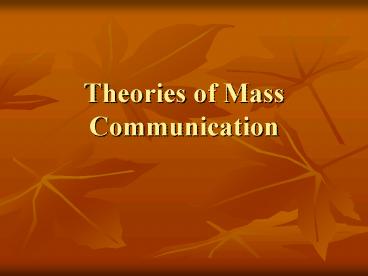Theories of Mass Communication - PowerPoint PPT Presentation
1 / 13
Title:
Theories of Mass Communication
Description:
Top movie directors used to motivate troops. Idea was to harness powerful mass media ... A time lag from headlines to poll results. Later, some critiques ... – PowerPoint PPT presentation
Number of Views:1981
Avg rating:3.0/5.0
Title: Theories of Mass Communication
1
Theories of Mass Communication
2
From Powerful to Minimal Effects
- Mass media A powerful persuasion tool
- Powerful effects model of mass media
- Hypodermic model injecting ideas/opinions
- War of the Worlds broadcast
- Hitlers use of media for persuasion
- Later replaced by minimal effects model
- Why we Fight series of movies
- Top movie directors used to motivate troops
- Idea was to harness powerful mass media
- Tested on troops, but found little attitude
change - New view media have little effect on views
opinions
3
From Minimal to Conditional Model
- But was evidence that media did matter!
- A more nuanced proposal emerged
- Avoided extremes of earlier models
- Keys to new perspective
- Mass media not all powerful
- Audience not passive waiting to be manipulated
- Mass media can have an effect on people/society
- Basic questions
- Who did it effect?
- When did it affect them?
- How did it affected them?
4
Agenda Setting Theory
- A reaction to Minimal Effects model
- Explained why minimal effects found
- Peoples opinions dont change
- Issue salience/relevance does change
- Mass media shape issue salience!
- Revived mass comm effects research
- Key Medias agenda ? publics agenda
- Media not good at telling us what to think media
are good at telling us what to think about - We judge important issues the media says is
important - We judge unimportant issues media ignores or
downplays
5
Research Results Mixed
- Early studies
- Issues prominent in media predict publics issues
- A time lag from headlines to poll results
- Later, some critiques
- Correlations Directionality, third variable
- Alt 1 public concern ? news
- Alt 2 reality ? news AND public concern
6
Refining Agenda Setting
- Other factors shaping process?
- Need for Orientation Low knowledge/education/sa
lience ? high reliance on media? - Who Sets Gatekeepers Agenda?
- elite media?
- politicians?
- interest aggregations?
- definition of news?
- Media profit-making pressures?
7
Uses and Gratifications
- Changes the basic question about medias role
- Used to be What do media do to us?
- Now was What do we do with the media?
- Assumes an active audience
- We choose whether or not to use and what we use
- We choose what content to view/hear/read
- We decide how to interpret
- We decide how to respond
8
Uses and Grats
- Desire for gratifications guides medium use
- What grats do we seek from media?
- Diversion stress relief, avoidance
- Social/parasocial relationships
- Identity needs Who we are/values clarification
- Surveillance Keep up with events
9
Updated version Uses and effects
- Are media or audience most powerful?
- Media content an important social force
- We decide what, when, how to engage content
- Maybe media and audience affect each other
- Might media use shape gratifications sought
- Maybe seeking gratifications leads to effects
- Reconciles two perspectives
- Role of audience
- Role of media content
10
Cultivation Theory
- Long-term debate about media effects
- Concerns that TV contributes to social problems
- Similar concerns about books, movies, comics
- If can prove link, may lead to solutions
- Focus Long-term effects of violent programs
- Exposure cultivates attitudes
- Attitudes reflect programmings distortions
11
Television Distorts Reality
- Violence Index violence on TV steady, high
- 2/3rds of all programs contain violence
- Adult dramas 5 violent acts/hour
- Kids shows 20 violent acts/hour
- Kids see 13,000 violent deaths by 18
- Violence by villains and heroes
- Other distortions found in studies
- Victims often female, minority, poorer
- Fewer kids, women, minorities, elderly appear
12
Effects of Exposure
- Cultivation Theory Hypotheses
- Heavy viewers ? television answer
- Light viewers ? more realistic answers
- Heavy viewing ? Mean World Syndrome
- Believe more likely to be victim, more fearful
- Believe police pervasive, aggressive
- More suspicious of others generally
13
Explanations for Effects
- Homogenization
- TV blurs, blends, bends views
- TV promotes TV mainstream view of world
- Some evidence in support
- Groups w/different views among light viewers do
not differ among heavy viewers - Attitudes to emerge from mean world
perceptions generally more conservative - Resonance TV reinforces real-world experiences
with violence -- doubly powerful































